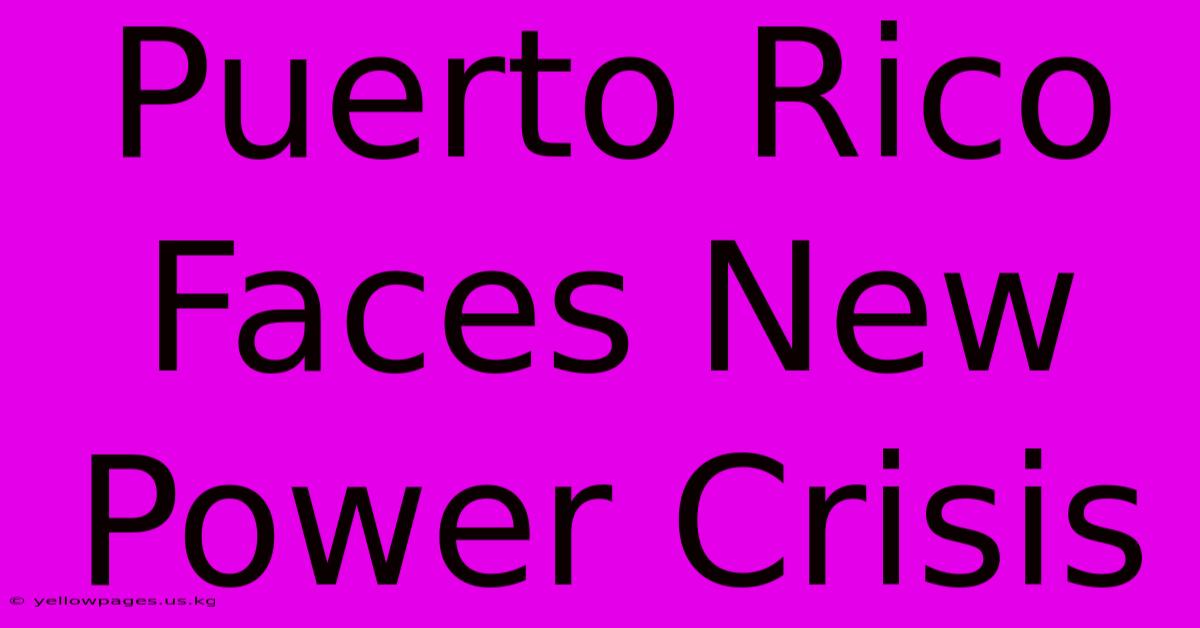Puerto Rico Faces New Power Crisis

Discover more detailed and exciting information on our website. Click the link below to start your adventure: Visit Best Website trendingnews.us.kg. Don't miss out!
Table of Contents
Puerto Rico Faces New Power Crisis: A Looming Energy Emergency
Puerto Rico, still reeling from the devastation of Hurricane Maria in 2017, finds itself grappling with a new and potentially more insidious energy crisis. This isn't about a single catastrophic event, but a slow-burning emergency fueled by a confluence of factors threatening the island's fragile power grid and its economic recovery.
The Perfect Storm: Understanding the Current Crisis
The current power crisis in Puerto Rico is a complex issue with multiple contributing factors:
Aging Infrastructure:
The island's power grid is ancient and dilapidated, a legacy of years of underinvestment and deferred maintenance. Hurricane Maria exposed the fragility of this system, causing widespread and prolonged outages. While repairs have been made, the underlying infrastructure remains vulnerable and prone to frequent failures, leaving many communities susceptible to power disruptions. This aging infrastructure is a major obstacle to reliable electricity delivery.
Fuel Costs and Dependence:
Puerto Rico remains heavily reliant on imported fossil fuels, making it incredibly vulnerable to fluctuations in global energy prices. These high fuel costs contribute significantly to the already high electricity rates, placing a heavy burden on residents and businesses. This fuel dependence leaves the island exposed to both price shocks and supply chain disruptions.
LUMA Energy Controversy:
The privatization of the island's power transmission and distribution system to LUMA Energy has been controversial. While proponents argue it brings needed expertise and investment, critics point to continued outages and slow progress in modernizing the grid. The ongoing debate surrounding LUMA's performance adds to the complexity of the crisis. Public trust in the company's ability to effectively manage the grid remains low.
Climate Change Impacts:
The threat of increasingly intense hurricanes and severe weather events exacerbated by climate change further jeopardizes the island's power grid. Future storms could cause even more widespread and prolonged outages, potentially setting back recovery efforts significantly. The growing impact of climate change is a long-term challenge demanding urgent attention.
The Human Cost: Beyond the Outages
The power crisis extends far beyond mere inconvenience. Frequent outages impact:
- Healthcare: Hospitals and medical facilities require reliable power for life-saving equipment. Outages put patients at risk and strain already limited resources.
- Businesses: Power disruptions disrupt operations, hinder productivity, and threaten economic stability. This particularly affects small businesses already struggling to recover from past challenges.
- Education: Schools and universities rely on electricity for teaching, learning, and administrative functions. Outages disrupt education and exacerbate existing inequalities.
- Quality of Life: Consistent access to electricity is crucial for basic necessities, comfort, and overall well-being. Frequent outages negatively impact the daily lives of Puerto Ricans.
Finding Solutions: A Path Forward
Addressing this crisis requires a multifaceted approach that includes:
- Investing in renewable energy sources: Transitioning to a more sustainable energy mix, utilizing solar, wind, and other renewable resources, is crucial to reduce reliance on fossil fuels and enhance energy security.
- Modernizing the grid: Significant investment in upgrading and strengthening the island's power grid is essential to enhance its resilience against future disruptions.
- Improving energy efficiency: Implementing energy efficiency programs can help reduce demand and alleviate strain on the existing system.
- Strengthening regulatory oversight: Effective regulation and oversight are necessary to ensure transparency, accountability, and efficient management of the energy sector.
- Increased Public-Private Partnerships: Collaboration between government, private entities, and international organizations is crucial to leverage resources and expertise effectively.
The energy crisis in Puerto Rico is a complex and urgent issue demanding immediate attention. Only through concerted effort and a comprehensive strategy can the island hope to achieve lasting energy security and economic stability. The future of Puerto Rico hinges on resolving this critical challenge.

Thank you for visiting our website wich cover about Puerto Rico Faces New Power Crisis. We hope the information provided has been useful to you. Feel free to contact us if you have any questions or need further assistance. See you next time and dont miss to bookmark.
Featured Posts
-
College Football Bowl Games Today
Jan 01, 2025
-
Dec 31 Game Kentucky Defeats Brown
Jan 01, 2025
-
Debrina Nyc Subway Fire Victim Identified
Jan 01, 2025
-
Nhl 2025 Winter Classic Drone Shot
Jan 01, 2025
-
New Years Eve Blackout Hits Puerto Rico
Jan 01, 2025
